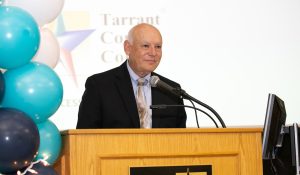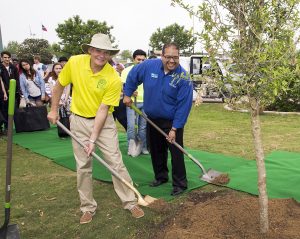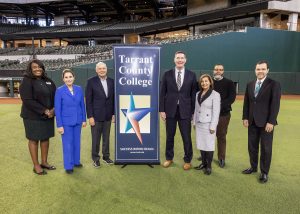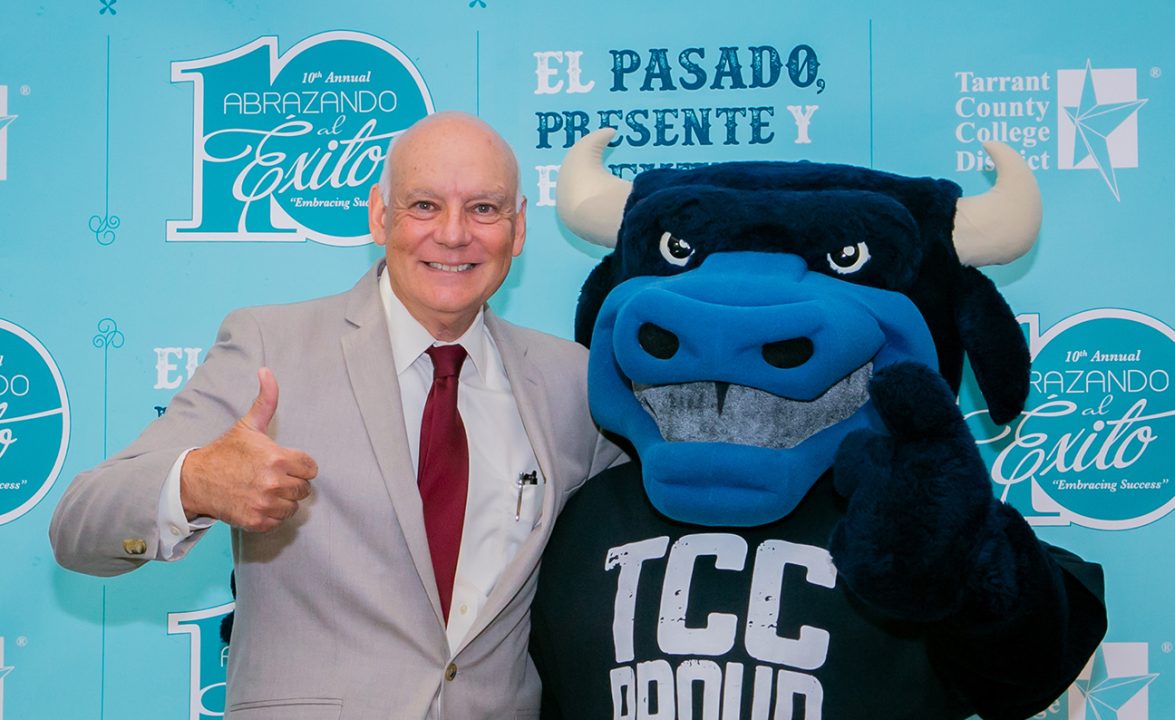Bill Coppola’s last day as president of Tarrant County College Southeast is Jan. 31, and he’s leaving a wealth of fond memories. Faculty and staff praise his openness, his faithful attendance at campus events, his civic presence throughout Arlington and Mansfield, and his easygoing style dealing with students.
One of those students, Anita Aiguokhian, gave a heartfelt summation in an interview with TCC’s student newspaper, The Collegian. “There’s going to be an empty space for now,” she said. “No one can be him.”
With barely a week remaining in his 12-year tenure, Dr. Coppola reflects on his community college epiphany, succeeding an icon, the sea change from VP status to a presidency, personal highlights, the decision to retire and his plans (maybe for a cruise).
You succeeded Judith Carrier, the founding president and a TCC legend. How did you approach that?
I did some homework. I was very intimidated when I saw Carrier Parkway. They named a freeway after her? The staff and several individuals reached out to me. Larry Darlage (former TCC Northeast president) was a big help. He said that when I came on, Judith would say, “It’s very much your campus.” She was fabulous at transitioning and took this campus to a really good level. All I had to do was tweak it to where the College needed to go.
I understand she really took you in hand.
Yes, she took me around town and introduced me to people. But I was very respectful and knew I had to grow into the position. It was intimidating because she was loved by all, and you had to come in saying, “I’m not Judith.”

This is your 40th year in higher education. What led you down this path?
I never really planned to go into teaching. My background is in radio and television. I worked for a PBS station in Michigan and was laid off because of Reaganomics. My wife and I came down to Texas — we had a friend here — looking for a job but couldn’t find one in television. I saw an ad that Northlake College (one of the Dallas Colleges) was starting a program in video technology. I thought, “What the heck. I’ll do that until I get a real job.” I got hired and classes started two weeks later.
What made you stay with teaching?
I really didn’t know much about community colleges. I started talking to my students about their careers and what they could do, and their comment to me was, “That’s nice, but I really just want to get into college because I’ve got to change, have to improve. I need a path out of poverty, and education is the way.” That opened me up, and I thought, “Oh, my gosh, I’m doing a lot more than teaching television.” I got more involved in different parts of the student life cycle and said, “This is the place for me.” You know when you’ve finally found your niche, and I said, “This is it.” I talked to administrators — my president and dean — and was lucky to have individuals who saw something in me that I didn’t see in myself, that I could have leadership skills.
You were a vice president at Lone Star College before coming to TCC. How was it transitioning to a presidency?
It’s night and day. I’ve got the job where everybody wants to tell me how to do it, but nobody wants to do it. The difference is that you really need to look at things through a different lens, a completely different lens, and it took me a couple of years. I was no longer a vice president, and I had to let my vice presidents be vice presidents. I need to know what’s going on, but they’re the vice presidents who need to do it.
What did that new lens show you?
You have to shift your vision to something much broader. My job has been looking at the campus as a whole, not just one area — looking at the College, where it was going, and then also working with fast-growing communities in Arlington and Mansfield.
You also have to have a more public persona, right?
I’m the face of the campus. Whether it’s positive or negative, it’s me. The hardest part of my job, and for my wife, too, is that there’s always something going on with the Chamber, with the Rotary, with the College and with the campus. I try to attend every single play, every musical concert. But I’ve also gone to every dinner and every event in town. Lots of chicken dinners. You have to be visible and transparent. People need to get to know you.

Any particular moments from those 12 years stand out?
I get asked that a lot. One was getting the early college high school built on the campus, incorporating it into the Arlington school district and seeing the success rates. Something I’m also very proud of is making sure that the campus is a place where different views can be discussed. We have 56 clubs on campus, and it’s very important that students can see all sides of views and have a place where they can express their own views. I am particularly proud of the work of the faculty when we were one of two community colleges in the country to receive the Dr. Eduardo Pardon award for institutional transformation. Expanding civic education and responsibility to the entire campus population. Also I think that Elva (Chancellor LeBlanc) has done a great job of moving the three goals and eight principles to implementation. In the principle I led (relations with high schools) we were able to get the director of educational partnerships approved for each campus, we got the district director done, we got tuition for online dual credit courses lowered to the in-state rate. We put together a program and handed it to TCC Connect (the College’s virtual campus), and it went online.
You pride yourself on the College and the campus being student centered.
The students look to us for guidance. There was a great quote by someone who said, “We are moving students from public assistance to being taxpayers.” That’s our community, and we have to accept that. You can’t just look at the affluent areas. In Arlington we talk about the entertainment district, but, hey, a large part live in poverty, with 80% of the students on free and reduced lunch. It’s always nice to tell the good stories, but the students are looking to us for help, and they know that education is the equalizer. At TCC we accept the top 100% of all high school graduates.
Why retire now? Was it difficult?
Oh, it was time. It wasn’t an overnight decision. I’m the second president here, and the College is moving in a really good direction — very progressive in meeting the needs of our students — and I think it’s time to have some leadership here that can take the campus to the next level. I work for a wonderful chancellor, and I want to make sure she has the people in place for her vision to go forward.

Where do you see TCC going?
I think we’re going to be a national standard. I absolutely do. I’ve always been in multicampus systems, and they all say, “We’re one college,” but they’re not. Their campuses are individual. What we do here is make decisions at a college level, not a campus level. Therefore, we get to work as much more of a team. The College views itself as being a contributor to the community and now to the North Texas region. It’s looking at education more as a solution to the problems and growth of the state. We’re very fortunate to have the resources to do what we need to do. If a company or a corporation needs something fast, we can flip it really quick. We learned through COVID that we can do anything.
So what’s next for you?
I’m going to try to take some time off. It’s a wonderful job, but it consumes a lot of your time. My wife and I, literally in the 12 years I’ve been here, have been on one vacation. Summers were always booked up with things like the budget. Her schedule — she’s CEO for Arlington Charities — means that when I have some time off, that’s her busiest time, around Thanksgiving and Christmas. We’ve been wanting to go on a river cruise. People tell me about them all the time.
Will you miss what you’ve had here?
(wistful) Absolutely. I’ll miss it a lot.
How are you planning to deal with it?
(after a pause) I really don’t know yet. I really don’t know.

